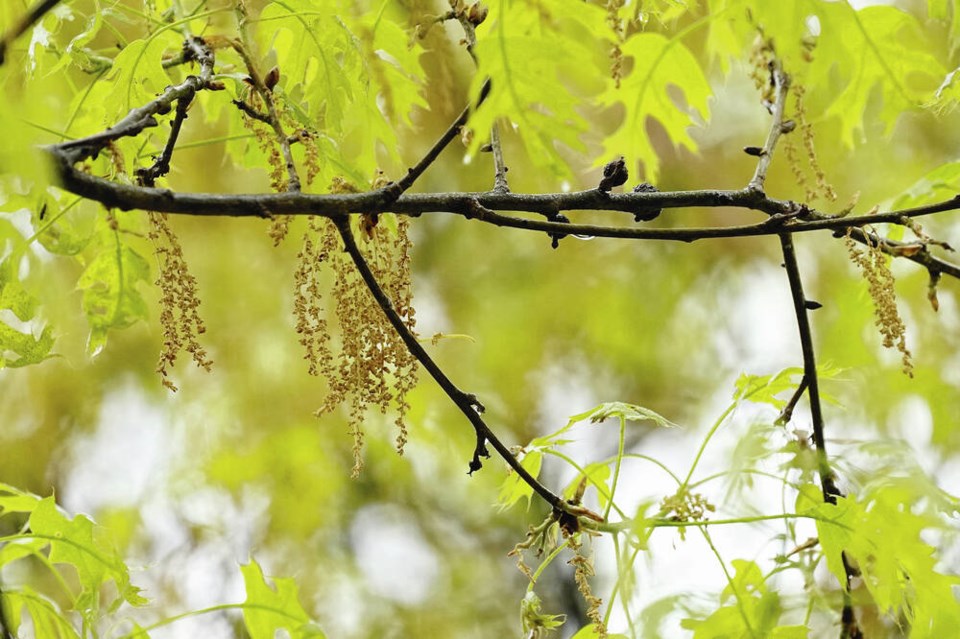It’s hay fever season again. Out here on the West Coast, it’s not so much a season as a condition, because something is always growing, blooming and spraying the air with its particular trigger to reach for the Kleenex.
Immunologically speaking, triggers are things that make your body automatically react, suddenly and uncontrollably, like when people tell you their astrological sign even though you don’t care and didn’t ask.
Usually the reaction involves a lot of sneezing, extremely itchy eyeballs and inappropriate amounts of mucous, especially for a workplace environment expecting an open collar shirt and chino pants, at the minimum.
The medical term for these triggers is “allergen,” which can be any substance that your immune system thinks is foreign and potentially dangerous, such as Americans. Really, it could be almost anything because, as immunologists point out, the human immune system is stupid and embarrassing.
For example, at this time of year my immune system is working overtime to protect me from the most foreign and dangerous substance it has come across, to date: plants. My body is producing several litres of mucous per day in order to safeguard me from dangerous front lawns and garden vegetables.
I’m not alone. According to the Canadian Society of Allergy and Clinical Immunology, 25 to 40 per cent of the Canadian population will suffer from hay fever at some point in their lives.
The most common allergens that bother us include:
• Pollen
• Dust
• Food
Most people can avoid these dangerous foreign substances by following a few simple guidelines:
Stay indoors on dry, windy days. If you absolutely must go outside, say because the baby is coming RIGHT NOW or you are out of bean dip, only go out during a heavy rainstorm, or late at night when plants and dust are sleeping.
Avoid mowing the lawn, pulling weeds and other gardening chores that stir up allergens and set a bad example for people like me who don’t want to do yard work today, or any day.
If you do have to go outside, remove all the clothes that you wore, and take a shower to rinse off pollen, dust and garden vegetables from your skin and hair.
Now that you’re safely inside, close all the windows and use air-conditioning in your house. If you don’t have air-conditioning in your house, use air-conditioning in your car as you drive to somebody else’s house that does have air-conditioning. Sleep on the living room sofa until allergy season is over, which is, as discussed, never.
During the day, leave a few bars of soap out here and there, so that passing air gets a bit of a scrub.
At night, use a portable high-efficiency particulate air (HEPA) filter in your bedroom. No one knows what “HEPA” stands for, but immunologists at Best Buy recommend you also buy a vacuum cleaner equipped with a HEPA filter to thoroughly clean all your carpets and pets.
Of course, allergy sufferers know that no matter how much cleaning you do inside, there is always going to be a lot of dust and pollen outside. Scientists believe this is because nature abhors a vacuum.
Fortunately, we have pharmacies and over-the-counter drugs to help keep mucous out of the workplace environment. Several types of these nonprescription medications can help, including:
Oral antihistamines. I am not a doctor, but I can read the back of the packages, which pretty much all say the same thing: “May help relieve sneezing, itching, a stuffy or runny nose, and watery eyes.” They also say, “May cause drowsiness,” which from personal experience I can tell you is an understatement. Now is not the time for you to try out Formula 1 racing.
Corticosteroid nasal sprays. These are drugs you squirt directly into your nostrils to stop things up, which is definitely something to put on your resume (but maybe don’t lead with it). Whatever this stuff is, it works like … uh, whatever the opposite of “gangbusters” is, which is what you want. Long-term use causes chronic nose bleeds, another resume-builder.
Oral decongestants. Hmmmm … What’s the difference between antihistamines and decongestants? Let’s see … From the package, these are chock full of cetirizine-pseudoephedrine, fexofenadine-pseudoephedrine, and loratadine-pseudoephedrine which could be good! Or bad. I would recommend you ask your doctor for advice, but you probably don’t have one, so maybe ask the high school-aged girl currently stocking the toothpaste shelf.
Some people take a drug-free approach to relieving the symptoms of allergies in a process called — I am not making this up — nasal irrigation. It pretty much means what you think it means: hosing out your nostrils with salt water in order to flush out the, uh … you know, all the stuff up in there. I am told this is very satisfying but I have not been brave enough to try it in case anybody found out.
And like in every other field of pseudo medicine where there is money to be made, there are plenty of alternative allergy treatments to try, including acupuncture (needles), reflexology (foot rubs), hypnosis (woo-woo) and diet (butterbur, spirulina and numerous, possibly made up, European-sounding herbs).
Will any of this actually work? Of course not! But it might help. And anyway, what are we going to do, avoid all the allergens by moving away from the West Coast?
I can tell you from personal experience there are way more triggers in Alberta.
>>> To comment on this article, write a letter to the editor: [email protected]



